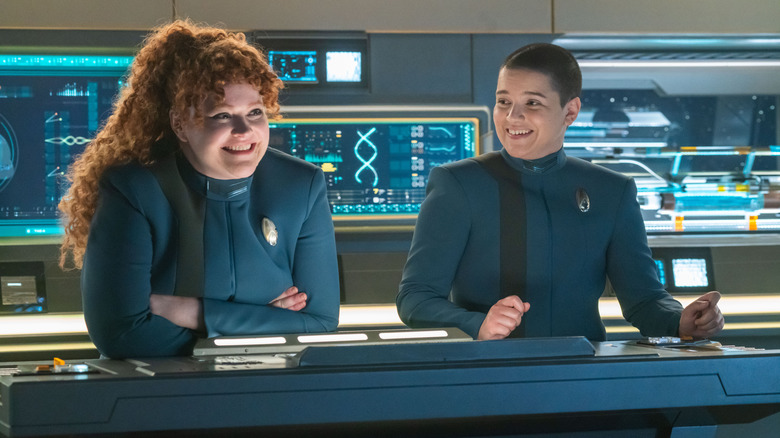Star Trek: Discovery's Blu Del Barrio Took An Adira Keepsake With Them From Set
The character of Adira Tal (Blu Del Barrio) was introduced in "Star Trek: Discovery" in the episode "People of Earth" (October 29, 2020). In that episode, the U.S.S. Discovery had only recently arrived in the 32nd century after being sucked through a time hole from the 23rd century. The Discovery crew eventually found the distant future remnants of the Federation, and submitted themselves for inspection, hoping to learn more about the future. They found that power had changed dramatically in the past 930 years, mostly thanks to a galaxy-wide cataclysm called the Burn wherein all viable starships spontaneously exploded. The Discovery and its crew were to undergo a brand-new mission to restore the Federation and assure the galaxy that Starfleet was still around and eager to return to its utopian ways.
While the Discovery was undergoing inspection by a militant future organization called the United Earth Defense Force, Paul Stamets (Anthony Rapp) met the 16-year-old Adira Tal, an officer who was fascinated with the Discovery's ability to travel across a galaxy-wide network of interdimensional spores. Adira, fascinated by the Discovery, asks to be transferred onto the crew as a science officer. In the "The Sanctuary" (December 3, 2020), Adira will explain that they use nonbinary pronouns, matching Del Barrio's own pronouns.
Adira Tal would appear in 29 episodes of "Discovery" in toto, all the way through the final episode, "Life, Itself" which aired on May 30. Del Barrio loved their time on "Discovery," and the emotional journey the character went on. Sadly, because "Star Trek" is so stingy about their props and makeup, De Barrio wasn't allowed to take much home in terms of keepsakes. However, they revealed, in a recent interview with TrekMovie, that they did get to keep one thing: the back of their set chair.
The value of little tiny bits of rubber
Know that the makers of "Star Trek" have always been very protective of the show's props and costumes. Because Trekkies are such a passionate lot, many of them would pay top dollar to possess a uniform, a prop tricorder, or a makeup appliance for their own personal collection. And, indeed, such props do take on a mythic quality over time; a pair of Leonard Nimoy's Vulcan ear tips from the original series are on display in the Smithsonian's Air and Space Museum.
As such, actors are typically not permitted to leave the set with makeup, communicators, or any other such tchotchkes. Del Barrio was lucky, however, in that they were able to abscond with a piece of their chair, that is the canvas strap yanked from the chair's wooded frame. When asked about souvenirs, they said:
"The only thing that I have ... I'm very happy I got something, because they keep so much of stuff for the archives and for fans and stuff like that. I didn't think I was going to take anything home, but I got the backing of my chair that says 'Adira' on it. And I'll keep that forever, and a bunch of my scripts and stuff. I wish I could have kept my badge, but those are apparently very precious and we could not take that. But I do have my chair backing and I love that."
One might assume that communicator badges would have been more openly distributed to actors, especially as shows wrapped their final episodes. Sadly, those badges are one of the most closely watched items. I think, though, we can all understand Del Barrio's desire to have one.
The weight of representation
Adira Tal is hardly the first nonbinary character on "Star Trek," and the franchise has encountered numerous genderless alien species, but Adira is the first openly nonbinary human character in the franchise. What's more Del Barrio is the first openly nonbinary performer in the franchise. They were soon followed by the nonbinary character Kova Rin Esmar, played by Jin Maley on "Star Trek: Picard." One cannot fault "Discovery" on its queer representation. Trek has always been a little slow on the trigger when it comes to depicting queerness, and even some of its attempts in the 1990s feel mawkish by today's standards.
"Discovery," meanwhile, features more queer characters than all of the previous shows combined, and multiple members of the cast are openly LGBTQIA+. When asked if their presence on the show came with a certain degree of pressure, Del Barrio admitted that, yes it certainly did. Being looked to as a positive role model stressed them out, and they admitted to "severe imposter syndrome" all throughout the show's third season. But then they realized being a positive role model is only going to be helpful to everyone. They said:
"I started thinking, it's kind of nice, maybe, for people to see someone who's at just the beginning of their transition and going through that and going through the anxieties and the worries and difficulties of that. So as scary as it was, and kind of as vulnerable as to sort of come out on television and also go through a lot of my medical transition while I was on 'Discovery,' I'm really proud that it's out there for anybody who felt like me, who was at the beginning of that journey and really freaked out and maybe also had impostor syndrome."
"Discovery" is on Paramount+.


